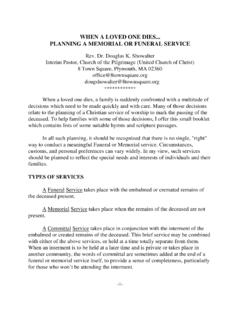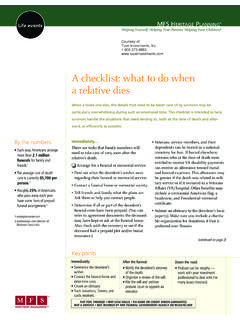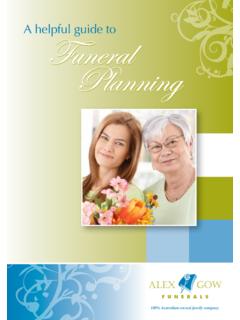Transcription of Future Care: First Party Pooled Trust: Amended August 27, …
1 Future Care: First Party Pooled trust : Amended August 27, 2015. Future CARE: First Party Pooled trust Questions & Answers Amended August 27, 2015. What is a Supplemental Needs trust ? Pooled Trusts are allowable under federal law. The Omnibus Budget Reconciliation Act of 1993 (OBRA. 1993) is the Federal Law that allows the establishment of a Pooled trust . The federal statute permitting Pooled Trusts is 42 1396 p (d) (4) (C). It reads: (C) A trust containing the assets of an individual who is disabled (as defined in section 1382c (a) (3) of this title) that meets the following conditions: (i) The trust is established and managed by a non-profit organization. (ii) A separate account is maintained for each beneficiary of the trust , but for purposes of investment and management of funds, the trust pools these accounts. (iii) Accounts in the trust are established solely for the benefit of individuals who are disabled (as defined in section 1382c (a) (3) of this title) by the parent, grandparent, legal guardian, individual or by a court.
2 (iv) For First Party trusts, upon the death of the beneficiary, the trust pays to the State from such remaining amounts in the account, an amount equal to the total amount of medical assistance paid on behalf of the beneficiary under the State plan. New York State Pooled Trusts are allowed under New York State Estates, Powers and Trusts Law, section 366. What is the purpose of the trust ? Individuals use Supplemental Needs Trusts (SNT) to provide financial security for their loved one with a disability. It is designed to supplement the beneficiary's basic needs but not supplant the public benefits that are available to provide those basic needs. Supplemental Needs Trusts allow people with disabilities to enjoy a better quality of life. Examples of things a trust can pay for The continuation of family traditions Resources needed to allow the person with a disability to pursue hobbies Vacations Education Home repairs Computers that facilitate communication Adaptive and medical equipment not covered or reimbursable through other insurances- to enhance quality of life The possibilities for the continuation or increased quality of life are substantial, particularly if funds are invested and handled responsibly for the sole benefit of the person with the disability.
3 In addition, Pooled trusts create an avenue for people with disabilities to be able to receive inheritances, wrongful death settlements and personal injury awards etc. without jeopardizing their public benefits. Rev. date Aug. 27, 2015 Page 1. Future Care: First Party Pooled trust : Amended August 27, 2015. Future CARE: First Party Pooled trust Questions & Answers Why are Pooled Trusts Necessary? The income and resource levels for public benefits programs are very low. Public programs only provide for basic needs and many parents use their own money to pay for the extra personal items and services which enhance their adult child's quality of life. Once a parent dies however, any money they leave to that child with a disability, even a small amount, will result in loss of public benefits, including residential services and Medicaid. Without Medicaid, services will be lost unless the person has the means to pay privately. Any inheritance would be used up quickly to privately pay for necessary services; this is generally not the intention of the parents who leave money for their children.
4 How do Pooled Trusts Work? In the case of a Non Profit Pooled trust , a master trust is established. The master trust holds sub accounts, meaning separate accounts are maintained for each individual beneficiary. All sub accounts are Pooled for investment, and management purposes. Since Pooled trusts are established for the benefit of people with disabilities, upon the death of the Beneficiary, the money remains in the trust to benefit other people with disabilities. Do I meet the Eligibility Criteria? Individuals who are disabled as defined in Social Security Law Section 1614(a) (3) [42 USC 1382c (a) (3)]. are eligible to establish a FCPS Pooled sub- trust account. There are no funding restrictions with respect to an individual's disability, ethnicity or religious beliefs. A disability determination from the Social Security Administration or Department of Human Services (Medicaid) office is required. In addition, The Future Care trust serves community members who reside within Monroe County and our neighboring counties.
5 Is Establishing a Community Pooled trust in my best interest? Only you can best answer this question. However; we, at Future Care encourage anyone considering a Supplemental Needs trust to gather as much information as possible on the subject matter in order to make an informed decision. We encourage people interested in our Future Care trust to consult with an attorney or certified financial planner who specializes in Supplemental Needs trust law prior to making a decision regarding joining the Future Care Community Pooled trust . FCPS can explain how the trust can help you. Only you, after consultation with an attorney who specializes in Supplemental NeedsTrusts, can decide if the Future Care trust is the best option for you. Rev. date Aug. 27, 2015 Page 2. Future Care: First Party Pooled trust : Amended August 27, 2015. Future CARE: First Party Pooled trust Questions & Answers Requests for disbursement: Who can submit a disbursement request: The Beneficiary and/or her/his authorized designee can submit a disbursement request.
6 Requests for disbursement must be for the sole benefit of the Beneficiary When can a disbursement request be submitted to Future Care trust : The Beneficiary and/or her/his authorized designee can submit a request during the lifetime of the Beneficiary and when funds are available to support the payment. **Expenses must be incurred prior to date of death and within 90 days of disbursement request submission. **. What documentation is needed: In general, Disbursement Request Form and supporting documentation (receipt, price quote, invoice, utility statement etc.) is needed. Specifically related to the following expenses: Rent A current signed lease/landlord agreement indicating the Beneficiary as tenant must be on file. The lease and/or rental agreement must identify all household members. Note: a lease between spouses will not be honored. Homeowner Association Fees a payment coupon in the name of the Beneficiary must be submitted. Mortgage a mortgage document or payment coupon in the name of the Beneficiary.
7 Credit Card Company- A current credit card statement and receipts documenting/supporting charges on account are for the sole benefit of the beneficiary. The complete detailed statement must be submitted along with itemized receipts for purchase to be paid. Funeral Expenses: Pre-Need Irrevocable Burial- A copy of the itemized bill. What types of businesses/services does the Future Care trust send payments to? All Disbursements must be made to third parties. The trust does not employ individuals to provide any service to the Beneficiary; therefore, all third Party service providers and vendors must be legitimate businesses or verified care providers. How are disbursement requests processed: Disbursement Requests and supporting documentation must be submitted in writing by mail, scanned and emailed or faxed to FCPS trust Dept. The request must be signed by the Beneficiary or other authorized individual in the Beneficiary Profile. Subsequently, authorized persons may be changed only by written request of the Sponsor Agreement signer.
8 Requests for disbursement are date stamped and reviewed upon receipt at office. The trust book-keeper or designee processes accordingly. Checks payable to venders are processed within 8-10. business days of receipt of disbursement request. Rev. date Aug. 27, 2015 Page 3. Future Care: First Party Pooled trust : Amended August 27, 2015. Future CARE: First Party Pooled trust Questions & Answers Are there limitations as to what types of expenses the trust can be used to pay? Yes Every request for disbursement is individually reviewed. Approval is at the sole discretion of the Trustees. The primary consideration in all reviews is to protect the Beneficiary's government benefits. Requests that may adversely affect government benefits, or are not for the sole benefit of the account Beneficiary, may be denied. Items ineligible for disbursements will not be paid. Prohibited distributions include, but may not be limited to the following: Disbursements payable to the Beneficiary Rent relating to a lease between spouses Tobacco and alcohol Bail, restitution, and related legal fees Fire arms Medicaid eligible expenses incurred after the trust was established.
9 Gifts/gift cards (this includes re-loadable cards). Donations Medical expenses eligible to reduce monthly surplus income Payments to financial institutions: debit charges, overdraft fees and lines of credit. Pornography Credit card interest, late fees or cash advances Expenses related to non-service related household pets Travel expenses for social or recreational activities ( gasoline or cab fare). Expenses incurred after date of death Please note: Requests to pay credit card invoices will be limited to current charges only. Disbursements for expenses incurred after death, will not be made from the beneficiary's sub- trust account. Lack of documentation or available funds will result in delayed processing time of disbursement requests. When can I start requesting disbursements from my account? Disbursements may begin when you receive your welcome letter packet. Please remember disbursements are only made after the fees are deducted and only if the $ minimum balance is maintained.
10 The Future Care trust holds payments to venders for 3 days to ensure the Spenddown check has cleared the bank and sufficient funds are available. Rev. date Aug. 27, 2015 Page 4. Future Care: First Party Pooled trust : Amended August 27, 2015. Future CARE: First Party Pooled trust Questions & Answers I have a bill I would like to have paid out of my trust account. How do I get my bill paid? Future Care trust uses a disbursement request form. This form is included with our welcome packet. All requests for disbursement must be submitted using a Future Care Community Pooled trust Disbursement Request Form signed by the Beneficiary or authorized representative. Disbursements must be for the sole benefit of the Beneficiary. All disbursements are made at the sole discretion of the Trustees. Appropriate documentation regarding the request must be attached. All information sought on the disbursement request form must be provided. Inappropriate requests and/or those lacking proper documentation will be denied and returned.







